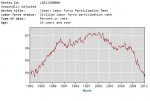Holy hell, how many times do we have to go over this? About half to two-thirds of the decline in the labor force participation rate is due to baby boomers reaching retirement age -- not the economy. As OC's graph indicates, the trend actually began in 2000 and it's accelerating as greater numbers of boomers hit 65.
http://chicagofed.org/digital_assets/publications/chicago_fed_letter/2012/cflmarch2012_296.pdf
The incredible shrinking labor force - The Washington Post
Here is the latest t01 chart from the BLS:
Table A-1. Employment status of the civilian population by sex and age
And here is a 2010 chart of U.S. population by age:
U.S. Population by Sex and Age, Census 2000 — Infoplease.com
The t01 chart shows that Civilian nonintitutional population continues to rise. That figure includes retirees, the overwhelming vast majority of whom are not institutionalized in rest homes. Thus births are continuing to out pace deaths, and indeed any chart of U.S. population growth validates that, as we're currently just a little under 1.0%, still a significant net rate for a population over 313 million.
The population by age chart shows that in 2010 those entering the work force, minimum age 16 and more practically around 16 through 24 were considerably higher in number/age than those likely entering retirement, 62-64, and even if you include forced retirement from lack of work from age 55, it's still smaller than the number/age of those entering the work force.
The reduction in the Civilian labor force can't be attributed to Boomers taking normal retirement.
People being forced into "retirement" and living off IRAs prior to age 62.5 is simply a technical form of unemployment, where they are unable to find work and are, at best, "employed" by their IRAs from an income sense. The great many of these without adequate personal retirement income are truly unemployed, even if they want to ratioalize that they are "retired".
Percentages are meaningless. What matters is the actual net number of new jobs and the actual net number of increase in people available to do those jobs. The available population is still increasing beyond the available jobs increase.
And, of course, none of this speaks to whether the jobs people are getting nowadays are
living-wage jobs.
When you look at the average age of those who would be entering the work force, 16-24, that's around 4.3 million/age.
When you look at the average age of those who would normally be entering retirement, 62-64, that's around 3.36 million/age.
Thus we're still bringing more into the work force than we're normally retiring.
When you look at all the ages in the 2010 census, it's pretty clear we're bringing more in than are retiring. So those aged birth-16 is much greater than those those aged retiring and still slightly higher than those masses 45-54 waiting in the wings to retire when you factor in the higher mortality rates of those compared to the birth-16 age group.
Thus boomer retirement simply isn't an issue with regard to the BLS numbers.
What is much more likely is the increasing number of unemployed in the "discouraged worker" category that are simply unaccounted for, the current figure likely being only 60% of the true total of unemployed "discouraged workers" according to one BLS agent with whom I spoke.
Indeed, in a population of 313 million with the BLS citing 242.8 million non-institutionalized, that means the BLS would have us believe that there are 70.2 million people in America in the military, prisons, mental institutions and geriatric convalescent hospitals, a whopping 22.4 percent of our population institutionalized, nearly one in every four people! That can't be a seriously accurate figure.
Here's a chart -
Live Births and Birth Rates, by Year — Infoplease.com - that shows that in 1945 - 1950 the Boomer birth rate increase, and that things remained fairly flat after that, until a post-Boomer drop off in the birth rate of their kids, but their kids' kids taking off again in the past twenty years who are now entering the work force in comparative numbers to their grandparents, the Boomers, retiring. Thus we're still increasing our population to this day.
And, we still need more jobs.
So where is our real unemployment problem?
It's really pretty obviously simple:
American jobs outsourced to other countries wage-slavers and in-sourced mostly to illegals.
Solve those two obvious problems, and we will not only increase the number of living-wage jobs for American citizens, but we will reduce our unemployment problem to next to zero.


